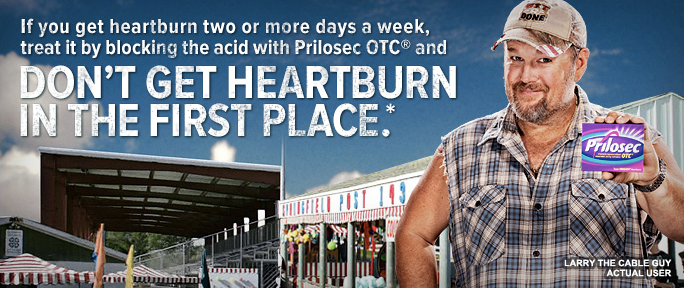- Sustainability
- DE&I
- Pandemic
- Finance
- Legal
- Technology
- Regulatory
- Global
- Pricing
- Strategy
- R&D/Clinical Trials
- Opinion
- Executive Roundtable
- Sales & Marketing
- Executive Profiles
- Leadership
- Market Access
- Patient Engagement
- Supply Chain
- Industry Trends
As American as Acid Reflux
The margins may be lower, but skirting access and reimbursement issues in an increasingly skeptical payer environment makes over-the-counter (OTC) products appealing to certain big players.
Over the counter drug advertising is less regulated than prescription drug marketing, and selling directly to consumers comes with the benefit of bypassing an expert middleman: your doctor. But companies should still promote with caution.

Comedian Larry the Cable Guy is a spokesperson for Prilosec OTC
The margins may be lower, but skirting access and reimbursement issues in an increasingly skeptical payer environment makes over-the-counter (OTC) products appealing to certain big players. Especially since FDA has signaled an openness to shifting more products into the shopping isle.
Pharma companies with the capability to sell quantity in mature markets are likely to benefit from popular prescription drugs turned OTC. In July, Pfizer said it would pay AstraZeneca $250 million plus royalties for rights to sell OTC Nexium, the blockbuster gastroesophageal reflux disease (GERD) drug, when it goes off patent in 2014.
Selling prescription drugs turned OTC is not without challenges, however. Strong marketing and promotional execution is a critical element of success, particularly since OTC drugs are often competing against generic products that cost the same or less with a prescription. Prilosec, AstraZeneca’s older GERD blockbuster, was ushered OTC by consumer packaged goods behemoth Proctor & Gamble nearly a decade ago; the drug was the first OTC proton pump inhibitor on the market.
Pfizer is known for the prowess of its marketing machine, but a degree of caution is in order, if P&G and the advertising approach of CPG companies in general is going to serve as the promotional model for prescription drugs reborn as OTCs.
A new thirty-second spot for Prilosec OTC, created by Publicis New York (which merged last month with its Publicis sister shop Kaplan Thaler Group to form Publicis Kaplan Thaler) features comedian Larry the Cable Guy, an “actual Prilosec OTC user.” The spot debuted in late June and is running on television and online, according to Kiera Casanova, senior account executive at Publicis Kaplan Thaler. Moviegoers in Brooklyn last weekend saw the ad prior to a screening of The Dark Knight Rises, and they could be forgiven for thinking Prilosec a panacea that obviates any need for dietary restraint.
“Know what I love about this country?” asks Larry in the opening frame, standing in front of someone grilling food on a barbeque. “Trick question! I love everything about this country, including Prilosec OTC!” Just one pill each morning treats your frequent heartburn, Larry says, “so you can enjoy all this great land of ours, as often.” That means demolition derbies and drive-through weddings, but more to the point, corn dogs. The ad ends with Larry and his two compatriots standing in front of a “Colossal Corn Dog” stand holding corn dogs. Instead of treating heartburn as it occurs, “don’t get heartburn in the first place,” by taking…you guessed it. The ad’s tagline – “one pill each morning, twenty-four hours, zero heartburn” – drives the message home: fatty foods have been associated with triggering heartburn, but there’s a pill for that.
Perhaps this is a message that some Americans want to hear. But it’s not a message that most healthcare providers would be comfortable with, and it’s not going to further the pharmaceutical industry’s desire to be seen as more concerned with health outcomes than sales figures. As new drugs climb over the counter from other therapeutic areas – the OTC heartburn category alone earned $1.4 billion in the US in 2010, according to the Consumer Healthcare Products Association – pharma will need to balance its consumer marketing with reputational considerations, even if regulators won’t be watching as closely.
The Weight-Loss Gold Rush: Legal and Regulatory Implications
July 11th 2024Jim Shehan, chair of the FDA Regulatory practice, Lowenstein Sandler, discusses how the FDA and other regulators likely to respond to the increased public interest and potential off-label use of GLP-1 drugs, what needs to be done for GLP-1s to be covered, advice for investors and financiers considering entering the weight-loss medication market and more.
Healthcare Marketing Strategies for Reaching Diverse Audiences
May 14th 2024Amanda Powers-Han, Chief Marketing Officer, Greater Than One, and Pharmaceutical Executive Editorial Advisory Board member, discusses how improved DE&I in healthcare marketing strategies can not only reach diverse audiences more effectively but also contribute to improved patient care outcomes, challenges faced in crafting culturally sensitive messages, and much more.
